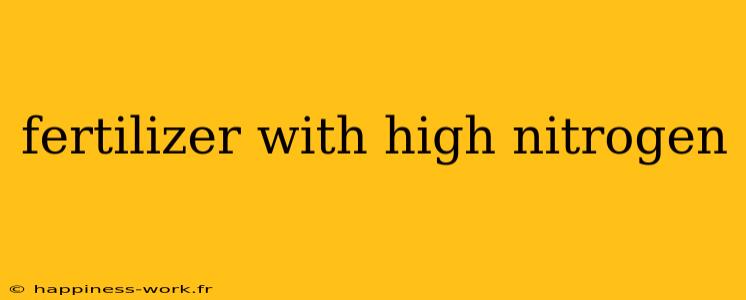Fertilizers are crucial for improving soil fertility and ensuring healthy plant growth. Among the various types of fertilizers, those with high nitrogen content are particularly valued. But what makes high nitrogen fertilizers so important, and how can you effectively use them in your gardening or farming practices? This article aims to answer these questions and provide additional insights into high nitrogen fertilizers, offering an in-depth understanding of their benefits and applications.
What Are High Nitrogen Fertilizers?
High nitrogen fertilizers are formulations that contain a significant amount of nitrogen, typically more than 20% of their total composition. Nitrogen is one of the three primary macronutrients required by plants—along with phosphorus and potassium. It is essential for various plant functions, including:
- Promoting lush, green foliage: Nitrogen is a key component of chlorophyll, which plants use to photosynthesize and produce energy.
- Supporting overall growth: Adequate nitrogen levels encourage vigorous growth, enhancing both crop yield and quality.
Types of High Nitrogen Fertilizers
High nitrogen fertilizers can be broadly categorized into two types:
-
Synthetic Fertilizers: These are chemically formulated products, such as urea, ammonium nitrate, and calcium nitrate. They release nutrients quickly, providing an immediate source of nitrogen for plants.
- Example: Urea (46-0-0) is a common synthetic nitrogen fertilizer that delivers a high concentration of nitrogen.
-
Organic Fertilizers: These are derived from natural sources, such as manure, blood meal, or fish emulsion. They release nitrogen more slowly compared to synthetic options, improving soil structure and microbial health over time.
- Example: Blood meal (12-0-0) is an organic high nitrogen fertilizer that provides a moderate amount of nitrogen while enriching the soil.
Benefits of Using High Nitrogen Fertilizers
High nitrogen fertilizers offer several advantages for gardeners and farmers:
-
Enhanced Leaf Growth: Ideal for leafy vegetables like spinach and lettuce, high nitrogen fertilizers help produce robust foliage, which is essential for photosynthesis.
-
Faster Maturation: Crops like corn and wheat benefit from nitrogen, leading to quicker growth cycles and earlier harvests.
-
Improved Overall Health: Adequate nitrogen supply strengthens plant resilience against diseases and pests, enhancing overall plant health.
-
Increased Yield: Applying high nitrogen fertilizers can significantly boost crop yield, making it particularly advantageous for commercial growers.
Analysis: When to Use High Nitrogen Fertilizers
Timing and application method are critical for maximizing the benefits of high nitrogen fertilizers. Here are some practical guidelines:
-
Soil Testing: Always start with a soil test to determine the nitrogen levels in your soil. Excessive nitrogen can lead to poor growth and environmental issues like water pollution.
-
Best Application Times: Apply high nitrogen fertilizers at key growth stages. For example, when growing leafy vegetables, apply in the early growth phase when plants are establishing themselves.
-
Methods of Application: Options include broadcasting, banding, or foliar feeding, depending on the crop and soil conditions.
Potential Downsides of High Nitrogen Fertilizers
While high nitrogen fertilizers have numerous benefits, it's essential to be cautious of potential drawbacks:
-
Risk of Burn: Over-application can lead to fertilizer burn, damaging roots and foliage.
-
Nutrient Imbalance: Excess nitrogen can inhibit the uptake of other essential nutrients, causing deficiencies in phosphorus or potassium.
-
Environmental Impact: Excess nitrogen can leach into waterways, leading to eutrophication, which harms aquatic ecosystems.
Conclusion
High nitrogen fertilizers can significantly enhance plant growth and yield when used correctly. Understanding their benefits, application timing, and potential risks is essential for optimizing plant health. Always prioritize soil health and fertility through responsible application practices.
Additional Value
For a more practical approach, consider integrating companion planting and crop rotation to maintain soil health while using high nitrogen fertilizers. For instance, planting legumes (which naturally fix nitrogen) alongside high nitrogen-using plants can optimize nutrient availability and reduce reliance on synthetic fertilizers.
In conclusion, high nitrogen fertilizers are a powerful tool for gardeners and farmers alike. By understanding their application and impact, you can grow healthier plants and contribute positively to your agricultural practices.
Attribution: This article incorporates information and questions from WikiHow, with authorship credit to the original contributors for their valuable insights on the topic of high nitrogen fertilizers. For more detailed instructions and tips, visit WikiHow's fertilizer guide.
